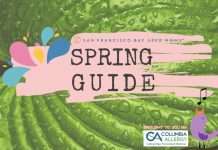
When my daughter was about eighteen months, she became interested in naming all of her body parts. It didn’t take long for her to point between her legs in the bath and ask me the name of that body part.
I had already decided that I was going to use the anatomically correct term, but so far I had avoided actually having to say it. Part of me ached to call it something cutesy and avoid having to get comfortable with the word vulva.
It ended up a win-win though, because my daughter repeated back to me in toddler-ese: “boba!” I was instantly relieved and I let her keep calling it a boba from thereon out.
But recently I have been thinking about it. While I was filling out the preschool enrollment forms, there was a section that asked me what my child uses to describe what she needs to do in the bathroom. I decided to add a little note there that my daughter calls her vulva her “boba”. I figured that would be important for the teachers to know, if she ever had an issue and she needed their help.
This leads me back to the reason why, in the first place, I made the decision to teach the correct terms (even though it didn’t quite work out that way).
Why Teaching Anatomically Correct Terms Matters
I have never used much baby talk. Other than “potty” and “boo-boo”, we speak to our child in correct English. I believe in beginning as I mean to go on, and I don’t see any reason to have to reteach a concept when a child is older, especially if it’s literally just another word.
I also do not think that any body part is taboo or shameful. I think that nick-naming private parts is totally fine, but I also think that completely avoiding certain terms sends the message that we are afraid to talk about it.
But there is another big reason why children need to know and be comfortable using the correct terms for their body parts.
Knowing the Names of Body Parts Can Prevent Child Abuse
In conjunction with teaching our kids what their body parts are called, we also need to start having conversations about safe touch from an early age. Those conversations can be simple. While I’m bathing my child, I’ll remind her that only mommy, daddy, or a doctor can touch her private parts. I also teach her to say that she doesn’t keep secrets if anyone ever asks her to.
Abusers know that children who are familiar with the correct terminology for their body parts have probably also had conversations about safe touch at home. They are less likely to risk abusing a child who has been educated about it.
If a child is sexually abused, they may reach out to a safe adult, like a teacher for help. If they aren’t using the correct terminology, that adult may have no idea what the child is saying. “He touched my bagel” isn’t going to raise the red flags that “He touched my vagina” will. We want to arm our children with the vocabulary they need to reach out for help if it’s ever (God forbid) necessary.
Scariest of all, an abuse claim may not hold up in court if the child uses a pet term to describe their private parts. Sexual abusers are walking free today because their victims did not use the correct physiological description of what happened to them. This horrifying fact reminds us that not only do our kids need to know the right terms, but they need to be comfortable saying them aloud.
What Are the Anatomically Correct Terms for Genitalia?
Boys:
- Penis
- Scrotum
- Testicles
Girls:
- Vulva
What about vagina?
Many parents do not realize that the external female genitalia is called the vulva. Vulva is the anatomically correct term for what you’re probably referring to when you teach your girl what her private parts are called. Vagina refers to the internal canal. You would probably only talk about it in the context of childbirth with a small child.
Getting Past the Stigma
It hasn’t been easy for me to fully embrace anatomically correct terms, even knowing all of this. I had an easy out when my daughter inadvertently invented her own term. And there have been plenty of moments while in public, I’m so glad she did. But it’s time for me to rectify this. I am planning to reteach the correct term by using restating language. So next time she says something about her “boba” I’m going to restate her sentence using the term “vulva” in its place.

















